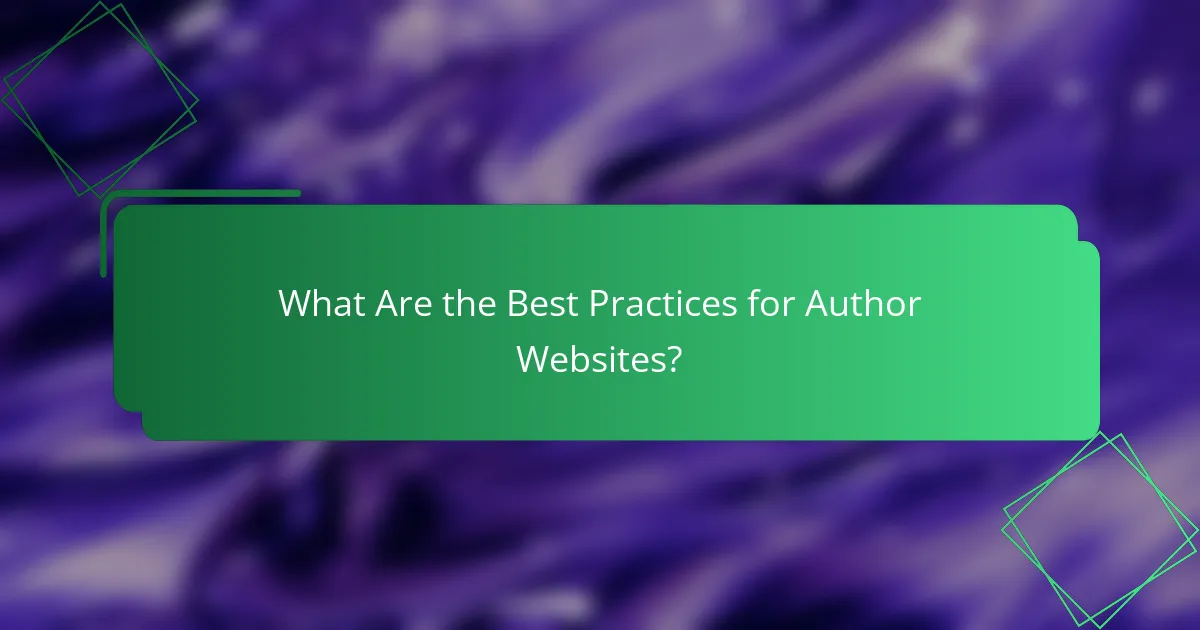Self-publishing offers fiction authors a unique opportunity to establish their brand and connect with readers. By defining their target audience, creating a distinctive author persona, and maintaining consistency across platforms, authors can build a memorable presence in the literary market. Effective branding techniques, such as designing eye-catching book covers and optimizing online visibility, are essential for standing out in a competitive landscape.

How Can Fiction Authors Build Their Brand?
Fiction authors can build their brand by clearly defining their target audience, creating a unique author persona, and maintaining consistency across all platforms. A strong brand helps authors connect with readers and establish a memorable presence in the literary market.
Define target audience
Identifying your target audience is crucial for effective branding. Consider demographics such as age, gender, interests, and reading preferences to tailor your messaging and marketing strategies.
Conduct surveys or engage in discussions on social media to gather insights about your potential readers. This information can guide your content creation and promotional efforts, ensuring they resonate with the right audience.
Create a unique author persona
Your author persona should reflect your writing style and personal values. Think about how you want to be perceived by readers—whether as a whimsical storyteller, a serious novelist, or an expert in a specific genre.
Develop a consistent voice and tone in your communications, from your website to your social media posts. This persona will help readers connect with you on a personal level and foster loyalty.
Develop a consistent visual identity
A cohesive visual identity includes your book covers, website design, and promotional materials. Choose a color palette, typography, and imagery that align with your author persona and genre.
Consistency in visuals helps create recognition and reinforces your brand. For example, if you write dark fantasy, use darker colors and gothic elements in your branding to attract the right audience.
Utilize social media platforms
Social media is a powerful tool for building your brand and engaging with readers. Choose platforms that align with your audience’s preferences, such as Instagram for visual storytelling or Twitter for quick updates and interactions.
Regularly share content that reflects your author persona, including writing tips, behind-the-scenes glimpses, and personal anecdotes. This engagement fosters a community around your work and keeps readers invested.
Engage with readers through newsletters
Newsletters are an effective way to maintain direct communication with your audience. Offer exclusive content, updates on new releases, and personal insights to keep readers informed and engaged.
Consider using a sign-up incentive, such as a free short story or a sneak peek of your upcoming book, to encourage subscriptions. Regularly scheduled newsletters help build anticipation and strengthen your brand’s relationship with readers.

What Branding Techniques Are Most Effective?
Effective branding techniques for fiction authors include creating a memorable book cover, optimizing an author website, employing SEO strategies, and utilizing content marketing. These methods help establish a unique identity and enhance visibility in a crowded marketplace.
Utilize book cover design
A compelling book cover design is crucial for attracting readers and conveying the genre and tone of your work. Invest in professional design services to ensure that your cover stands out and resonates with your target audience. Consider elements like color schemes, typography, and imagery that reflect your story’s themes.
For example, a thriller might use dark colors and bold fonts, while a romance novel could feature softer hues and elegant scripts. Consistency in design across your book series can further strengthen your brand identity.
Leverage author website optimization
Your author website serves as a central hub for your brand, so optimizing it for user experience and search engines is essential. Ensure that your site is visually appealing, easy to navigate, and mobile-friendly. Include sections for your books, a blog, and a mailing list sign-up to engage visitors.
Utilize clear calls-to-action, such as “Buy Now” buttons and links to social media profiles. Regularly update your content to keep readers informed about new releases and events, which can help build a loyal following.
Implement SEO strategies for visibility
Search Engine Optimization (SEO) is vital for increasing your online visibility. Research relevant keywords related to your genre and incorporate them into your website content, blog posts, and book descriptions. This practice helps improve your rankings on search engines, making it easier for potential readers to find you.
Consider using tools like Google Keyword Planner or SEMrush to identify high-traffic keywords. Regularly updating your content and building backlinks from reputable sites can further enhance your SEO efforts.
Use content marketing for engagement
Content marketing allows you to engage with your audience and showcase your expertise. Create blog posts, videos, or podcasts that relate to your writing or the themes of your books. This not only provides value to your readers but also helps establish your authority in your genre.
For instance, if you write historical fiction, consider sharing articles about the historical events that inspire your stories. Engage with your audience through social media by sharing updates, asking for feedback, and participating in discussions to foster a community around your brand.

How Important Is Social Media for Branding?
Social media is crucial for branding as it allows fiction authors to connect directly with their audience, build a loyal following, and enhance their visibility. By leveraging various platforms, authors can create a recognizable brand that resonates with readers and fosters engagement.
Build community with readers
Creating a community around your work helps foster loyalty among readers. Engage with your audience by responding to comments, participating in discussions, and hosting Q&A sessions. This interaction can transform casual readers into dedicated fans who feel personally connected to your brand.
Consider using platforms like Facebook Groups or Discord servers to create spaces where readers can discuss your books and share their thoughts. Regularly hosting virtual events or book clubs can also strengthen this sense of community.
Promote new releases and events
Social media is an effective tool for announcing new book releases and events. Use eye-catching visuals and engaging captions to generate excitement and anticipation among your followers. Regular updates can keep your audience informed and eager for your next work.
Utilize countdowns, sneak peeks, and exclusive content to create buzz. Collaborating with other authors or influencers for joint promotions can also expand your reach and attract new readers.
Share behind-the-scenes content
Sharing behind-the-scenes content humanizes your brand and allows readers to connect with you on a personal level. Post updates about your writing process, character development, or even challenges you face as an author. This transparency can make readers feel more invested in your journey.
Consider using Instagram Stories or TikTok to share short clips or photos of your workspace, drafts, or brainstorming sessions. This type of content can spark interest and encourage readers to follow your progress closely.

What Are the Best Practices for Author Websites?
Author websites should effectively showcase your brand, provide essential information, and engage your audience. Key practices include ensuring mobile responsiveness, maintaining a blog for updates, and optimizing for search engines to enhance visibility.
Ensure mobile responsiveness
Mobile responsiveness is crucial as a significant portion of web traffic comes from mobile devices. A responsive design automatically adjusts the layout based on the screen size, ensuring a seamless user experience across smartphones and tablets.
To achieve this, use flexible grids and layouts, and test your website on various devices. Tools like Google’s Mobile-Friendly Test can help identify issues and suggest improvements.
Include a blog for updates
A blog is an effective way to keep your audience informed and engaged. Regularly posting updates about your writing process, book releases, and events can foster a connection with readers and encourage them to return to your site.
Consider creating a content calendar to plan your posts. Aim for consistency, whether it’s weekly or monthly, and include a mix of topics such as writing tips, personal anecdotes, and industry news to maintain interest.
Optimize for search engines
Search engine optimization (SEO) helps your website rank higher in search results, making it easier for potential readers to find you. Focus on using relevant keywords, optimizing page titles, and creating quality content that answers common questions in your genre.
Utilize tools like Google Analytics to track your website’s performance and adjust your strategy based on what works. Regularly updating your content and ensuring fast loading times can also improve your search rankings.
